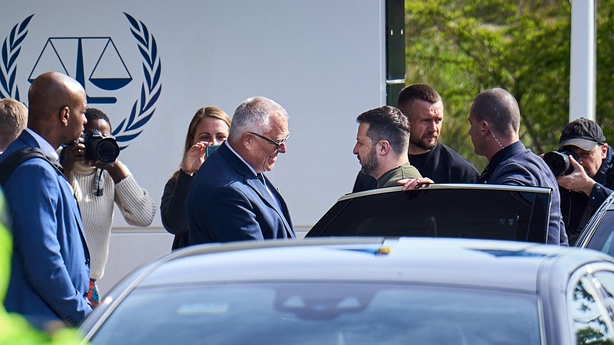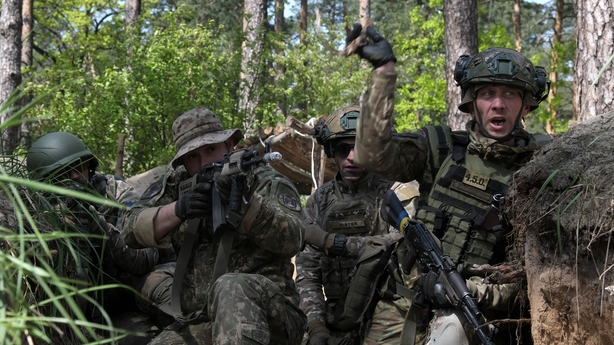Russian President Vladimir Putin must be brought to justice for his war in Ukraine, Ukrainian President Volodymyr Zelensky said in The Hague, calling for the creation of a special tribunal dedicated to judging Russia's invasion.
"We are going to set up a separate tribunal to show these people are not untouchable," Mr Zelensky told a news conference. "We need justice."
The International Criminal Court (ICC), a permanent war crimes court based in The Hague, in March issued an arrest warrant for Mr Putin for suspected deportation of children from Ukraine, which would be a war crime.
But the ICC does not have jurisdiction over the crime of aggression in Ukraine.
An act of aggression is defined by the United Nations as the "invasion or attack by the armed forces of a state (on) the territory of another state, or any military occupation".
The European Commission, among others, has said it supports the creation of a separate international centre for the prosecution of the crime of aggression in Ukraine, that would be set up in The Hague.
"We all want to see a different Vladimir here in The Hague, the one who deserves to be sanctioned for his criminal actions here, in the capital of international law," Mr Zelensky said in a speech earlier in the day, referring to the Russian president.
"I'm sure we will see that happen when we win, and we will win," he said.
Major legal and practical questions remain around how a new court to judge aggression would be legitimised, either by a group of countries supporting it or with approval from the UN General Assembly.
Russia is not a member of the ICC and already rejects its jurisdiction.
Mr Zelensky, dressed in his trademark khaki outfit, was welcomed at the court by its president, judge Piotr Hofmanski

It denies committing atrocities during its conflict with Ukraine, which it terms a "special operation" to "demilitarise" its neighbour.
Earlier in the day, as he left the ICC after a visit of just under an hour, Mr Zelensky, dressed in his trademark khaki, waved at a Ukrainian family standing outside the ICC building as they shouted "Slava Ukraini" - or Glory to Ukraine.
Read more: Russia claims US masterminded drone attack on Kremlin
The Netherlands has been a strong supporter of Ukraine, with Dutch Prime Minister Mark Rutte in February saying he did not rule out any kind of military support for Kyiv as long as it did not bring NATO into conflict with Russia.
Pledging "unwavering support", Mr Rutte said there were "no taboos" on sending F-16 fighter jets to Ukraine, and that discussions were underway with other countries on the matter, before adding: "We are not there yet."
Russian 'kamikaze' drone strikes
Russia fired two dozen combat drones at Ukraine early this morning, striking a university campus in the Black Sea city of Odesa and attacking the capital Kyiv for the third time in four days.
Russia has stepped up attacks as Ukraine prepares for a counteroffensive to try to retake Russian-occupied land in the south and east.
Russian shelling in the frontline southern region of Kherson killed at least 23 civilians on yesterday.
Air Force Colonel Yuriy Ihnat said Russia's military was using "kamikaze" drones, which fly towards their target before blowing up, to weaken Ukrainian air defences.
"They know the (drones) will be destroyed, we are currently destroying 80%, that's how they are exhausting our air defence so much, forcing them to expose their positions," he said on television.
No casualties were reported in the overnight strikes.
In Kyiv, the city administration said that missiles, probably ballistic missiles, had also been used in the attack but were shot down along with all the drones over the capital.
Ballistic missiles are difficult to shoot down, and their downing could indicate Ukraine used sophisticated Western-supplied air defence systems against them.

Kyiv authorities said "enemy aerial objects" had been downed over three districts in the capital's centre and that debris had fallen around ten buildings.
"As a result of the falling debris, parked cars ... and the road's surface were partially damaged," said Serhiy Popko, head of the city's military administration.
In total, air defences shot down 18 of 24 'kamikaze' drones in the pre-dawn attack, officials said. Of 15 drones fired at Odesa, 12 were downed but three struck a university campus, the southern military command said.
Shelling in the Donetsk region damaged a power station owned by electricity company DTEK Energo, but no casualties were reported, DTEK and the energy ministry said.

